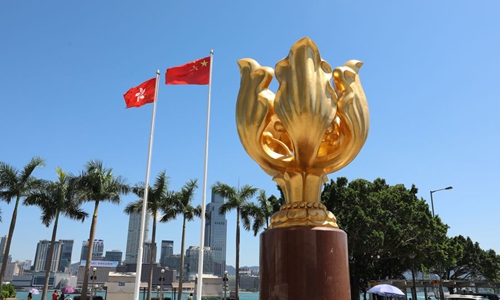Relief for Hong Kong housing woes?
By Zhao Juecheng and Hu Yuwei Source:Global Times Published: 2020/5/21 21:36:41
Cities in Chinese mainland may offer space for ‘new towns’

Photo taken on Aug. 5, 2019 shows China's national flag and the flag of the Hong Kong Special Administrative Region on the Golden Bauhinia Square in Hong Kong, south China. (Xinhua/Wu Xiaochu)
A Hong Kong deputy's proposal at the two sessions for Hong Kong to lease 30 square kilometers of land in the Chinese mainland to house hundreds of thousands may offer relief for Hong Kong's housing woes. Regional integration is also a desired outcome of the proposal.
Cheng Yiu-tong, a deputy from Hong Kong to the 13th National People's Congress (NPC), initiated a proposal to advise the central government to lease land to the HKSAR and establish new towns to tackle its housing crisis. The proposal was thought to address Hong Kong's dire shortage of land that constrains Hong Kong's development, Cheng told the Global Times on Monday.
Cheng suggested the land leased by the central government could cover 30 square kilometers which may accommodate 600,000 residents. The Hong Kong government can also invite commercial land developers to develop hospitals, high-technology industry and other facilities for driving the region's growth.
Cheng's proposal was inspired by the "Hengqin model" that the central government drew up in 2009 to inspire shared development of Macao and the mainland.
In the Guangdong-Hong Kong-Macao Greater Bay Area (GBA), Hengqin, an island in South China's Guangdong Province, has provided innovative opportunities for Macao to integrate with the mainland. It won 40-year land-use rights for the leasing of the University of Macau's new campus placed under Macao SAR's jurisdiction and law enforcement.
If Cheng's proposal is approved by the central government, it is expected that initial construction of the new residential community could be completed in two to three years.
"Due to insufficient land reserves of HKSAR government, public housing is in short supply and the prices charged by private developers are out of reach of ordinary people," said Cheng, who added that the problem has caused many families to live in subdivided, tiny, windowless cubicles in old buildings known as Tong Lau.
Hong Kong Chief Executive Carrie Lam publicly acknowledged the issue and unveiled a colossal project - Lantau Tomorrow Vision - to develop Hong Kong's biggest island and surrounding areas. But analysts suggested that its implementation is likely to meet political resistance in the Legislative Council due to the "politicization of livelihood issues by internal and external forces," according to Cheng.
The Global Times learned that similar proposals from Hong Kong representatives would be heard at the 13th NPC such as the suggestion to create a "Hong Kong city" by reclaiming the land in the sea area near Guishan island in Zhuhai, Guangdong Province, to ease Hong Kong's housing difficulty.
Since the Greater Bay Area development plan came out in 2019, more Hong Kong residents can work in the HKSAR and buy homes in the GBA .The Hong Kong-Zhuhai-Macao Bridge cut the travel time among the three cities from three hours to 30 minutes, and strengthened the transport connections between Hong Kong and cities in the Pearl River Delta.
"The central government will continue to introduce policies and measures to improve the well-being of Hong Kong residents living in the mainland, for instance, to create new opportunities for young people from Hong Kong in the GBA," Xu Luying, a spokesperson of the Hong Kong and Macao Affairs Office of the State Council, China's cabinet, said at a press conference on July 29, 2019.
But Cheng's proposal triggered some controversy on the mainland social media as unrest in Hong Kong has led to a wave of sentiment among some mainland netizens who are opposed to more favorable policies for Hong Kong.
"The central government has tried to allocate good resources for Hong Kong despite a land shortage in South China. But there are some Hong Kong people who will never be grateful for the favorable policies, and they will keep making troubles," a netizen commented on Chinese Twitter-like Sina Weibo.
Cheng said he understands the frustration behind some negative sentiments, adding the communication gap is currently the biggest barrier for Hong Kong to further integrate into the nation's overall development plan.
Posted in: INDUSTRIES,MARKETS,DEPUTY AND MEMBER